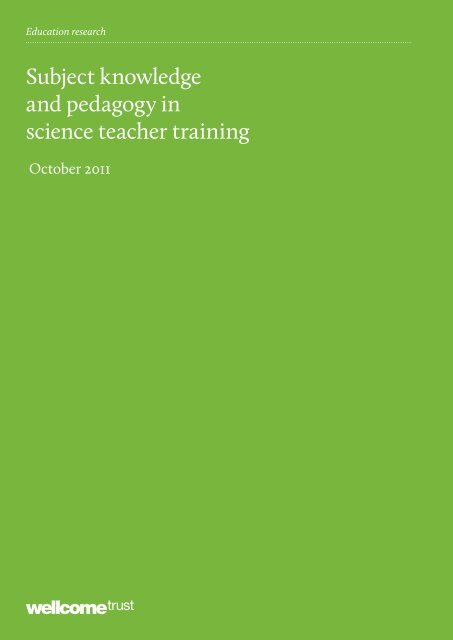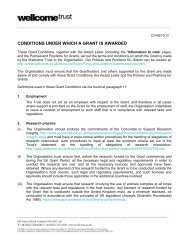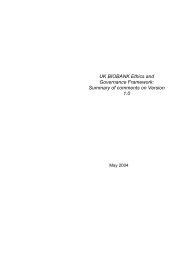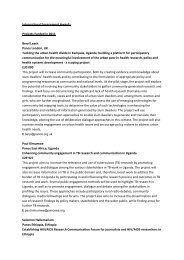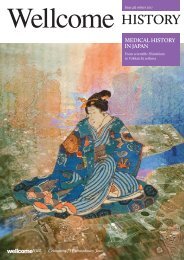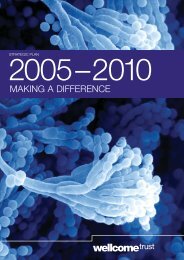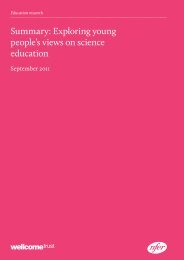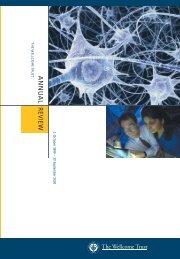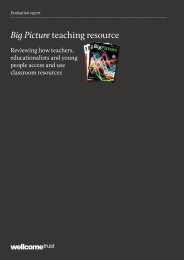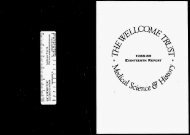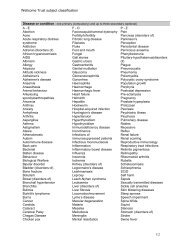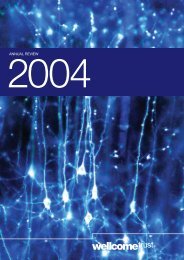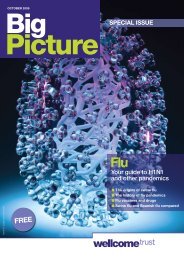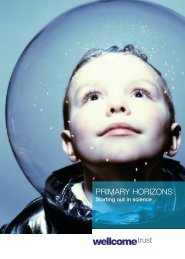Subject knowledge and pedagogy in science ... - Wellcome Trust
Subject knowledge and pedagogy in science ... - Wellcome Trust
Subject knowledge and pedagogy in science ... - Wellcome Trust
You also want an ePaper? Increase the reach of your titles
YUMPU automatically turns print PDFs into web optimized ePapers that Google loves.
Education research<br />
<strong>Subject</strong> <strong>knowledge</strong><br />
<strong>and</strong> <strong>pedagogy</strong> <strong>in</strong><br />
<strong>science</strong> teacher tra<strong>in</strong><strong>in</strong>g<br />
October 2011
Education research<br />
<strong>Subject</strong> <strong>knowledge</strong> <strong>and</strong> <strong>pedagogy</strong><br />
<strong>in</strong> <strong>science</strong> teacher tra<strong>in</strong><strong>in</strong>g<br />
John Holman, Senior Fellow for Education at the <strong>Wellcome</strong> <strong>Trust</strong><br />
Background<br />
In December 2009, the <strong>Wellcome</strong> <strong>Trust</strong> commissioned<br />
Roger Lock <strong>and</strong> colleagues at the University of<br />
Birm<strong>in</strong>gham to carry out a study of the subject content<br />
of one-year postgraduate tra<strong>in</strong><strong>in</strong>g courses for secondary<br />
<strong>science</strong> teachers. Realis<strong>in</strong>g that most secondary <strong>science</strong><br />
teachers are required to teach outside their <strong>science</strong><br />
specialism, the <strong>Trust</strong> was <strong>in</strong>terested to know how tra<strong>in</strong>ees<br />
acquire subject <strong>knowledge</strong> (as opposed to general teach<strong>in</strong>g<br />
skills), <strong>and</strong> whether there are significant variations between<br />
<strong>in</strong>stitutions.<br />
The study <strong>in</strong>volved more than half of Initial Teacher<br />
Tra<strong>in</strong><strong>in</strong>g (ITT) <strong>in</strong>stitutions <strong>in</strong> universities <strong>in</strong> Engl<strong>and</strong><br />
<strong>and</strong> Wales. It used a comb<strong>in</strong>ation of document analysis,<br />
questionnaires <strong>and</strong> <strong>in</strong>terviews with tutors <strong>and</strong> tra<strong>in</strong>ees:<br />
<strong>in</strong> all, 54 per cent of tutors <strong>and</strong> 245 tra<strong>in</strong>ees from six<br />
case study universities responded to questionnaires.<br />
Respondents were self-selected <strong>in</strong> the sense that they<br />
volunteered to take part <strong>in</strong> the study, but they were<br />
distributed fairly evenly both geographically <strong>and</strong> by type<br />
of <strong>in</strong>stitution.<br />
Start<strong>in</strong>g out as a <strong>science</strong> teacher<br />
ITT <strong>in</strong>stitutions prepare tra<strong>in</strong>ees for teach<strong>in</strong>g across all<br />
three major <strong>science</strong>s: physics, chemistry <strong>and</strong> biology. Most<br />
tra<strong>in</strong>ees will end up teach<strong>in</strong>g outside their ma<strong>in</strong> degree<br />
specialism, at least <strong>in</strong> Key Stage 3, <strong>and</strong> it is not uncommon<br />
to f<strong>in</strong>d tra<strong>in</strong>ees teach<strong>in</strong>g (say) physics who have themselves<br />
studied no physics beyond the age of 16. Yet effective <strong>and</strong><br />
<strong>in</strong>spir<strong>in</strong>g teach<strong>in</strong>g requires the teacher to underst<strong>and</strong> the<br />
subject matter <strong>in</strong> greater depth than the level they are<br />
teach<strong>in</strong>g at, so the acquisition of sound subject <strong>knowledge</strong><br />
<strong>and</strong> <strong>pedagogy</strong> is a particularly important part of a <strong>science</strong><br />
teacher’s tra<strong>in</strong><strong>in</strong>g.<br />
The report found that among tra<strong>in</strong>ees, biology specialists<br />
predom<strong>in</strong>ate, the ratio of biologists to chemists to<br />
physicists be<strong>in</strong>g 5:3:2. Moreover, biology specialists tended<br />
to have better-quality degrees than physical scientists, <strong>and</strong><br />
one-third of those with a declared specialism <strong>in</strong> physics<br />
had a limited physics component to their degree – which<br />
might, for example, be <strong>in</strong> eng<strong>in</strong>eer<strong>in</strong>g or sport <strong>science</strong>.<br />
With so much variability <strong>in</strong> subject specialism, the<br />
challenge of br<strong>in</strong>g<strong>in</strong>g the subject <strong>knowledge</strong> <strong>and</strong> <strong>pedagogy</strong><br />
of all tra<strong>in</strong>ees to a level where they can teach <strong>science</strong><br />
across the breadth of the National Curriculum to age<br />
16 is considerable. In fact the report concludes that it is<br />
unrealistic to expect tra<strong>in</strong>ees to develop sufficiently secure<br />
subject <strong>knowledge</strong> <strong>and</strong> <strong>pedagogy</strong> <strong>in</strong> both their specialist<br />
<strong>and</strong> non-specialist areas through a one-year course.<br />
<strong>Subject</strong> <strong>knowledge</strong> <strong>and</strong> teach<strong>in</strong>g skills<br />
The report usefully dist<strong>in</strong>guishes between three categories:<br />
• ‘Pure’ <strong>science</strong> subject <strong>knowledge</strong> (SK).<br />
• Topic specific <strong>pedagogy</strong> (TSP): the skills <strong>and</strong> methods<br />
needed to teach specific topics with<strong>in</strong> <strong>science</strong>.<br />
• General <strong>pedagogy</strong>: skills <strong>and</strong> methods applicable across<br />
all subjects (for example, behaviour management).<br />
Science subject <strong>knowledge</strong> is taught through a<br />
comb<strong>in</strong>ation of SK <strong>and</strong> TSP, with TSP predom<strong>in</strong>at<strong>in</strong>g.<br />
The majority of SK <strong>and</strong> TSP are delivered <strong>in</strong> the tra<strong>in</strong>ee’s<br />
<strong>in</strong>stitution, as opposed to the placement school <strong>in</strong> which<br />
they do their teach<strong>in</strong>g practice. However, the amount of<br />
time given to <strong>science</strong> <strong>knowledge</strong>, <strong>and</strong> <strong>in</strong> particular the<br />
relative proportions of SK <strong>and</strong> TSP, vary widely between<br />
<strong>in</strong>stitutions.<br />
Some tra<strong>in</strong>ees take ‘subject <strong>knowledge</strong> enhancement’<br />
courses before embark<strong>in</strong>g on the ITT year. In such courses,<br />
tra<strong>in</strong>ees may be taught by specialist scientists or by<br />
education tutors. Tra<strong>in</strong>ees express a clear preference for<br />
learn<strong>in</strong>g <strong>science</strong> <strong>knowledge</strong> through the latter.<br />
While on school placement, tra<strong>in</strong>ees are supported by a<br />
school mentor, <strong>and</strong> ITT <strong>in</strong>stitutions expect the mentor<br />
to monitor <strong>and</strong> set targets for subject <strong>knowledge</strong>, though<br />
the extent to which this happens <strong>in</strong> practice is unclear <strong>and</strong><br />
appears to be very variable.
The National Curriculum for Science expects pupils<br />
to have both <strong>knowledge</strong> <strong>and</strong> underst<strong>and</strong><strong>in</strong>g of <strong>science</strong><br />
content (for example, the laws of motion, the periodic<br />
table) <strong>and</strong> an underst<strong>and</strong><strong>in</strong>g of the methods <strong>and</strong> processes<br />
of <strong>science</strong> (‘How Science Works’). The study f<strong>in</strong>ds that How<br />
Science Works is not identifiable as a major component of<br />
ITT courses, which is surpris<strong>in</strong>g given the emphasis on this<br />
area <strong>in</strong> the National Curriculum.<br />
What do tra<strong>in</strong>ees th<strong>in</strong>k<br />
Faced with a broad <strong>science</strong> curriculum, much of it outside<br />
their specialist area, what is the response of tra<strong>in</strong>ees<br />
Most ITT <strong>in</strong>stitutions require tra<strong>in</strong>ees to carry out a<br />
‘subject <strong>knowledge</strong> audit’ to identify the areas where their<br />
<strong>knowledge</strong> needs improv<strong>in</strong>g. However, tra<strong>in</strong>ees f<strong>in</strong>d the<br />
audit process <strong>in</strong>efficient <strong>and</strong> the report shows a consensus<br />
belief <strong>in</strong> leav<strong>in</strong>g <strong>science</strong> <strong>knowledge</strong> to be learned when it is<br />
needed.<br />
So tra<strong>in</strong>ees normally wait until they know what topics<br />
outside their specialism they will be teach<strong>in</strong>g (<strong>in</strong> their<br />
school placement or their first teach<strong>in</strong>g job) before learn<strong>in</strong>g<br />
the necessary subject <strong>knowledge</strong> <strong>and</strong> <strong>pedagogy</strong>. When they<br />
do so, they tend to use books <strong>and</strong> other material resources<br />
to ‘swot up’ SK, but rely more on human resources –<br />
especially experienced teachers <strong>and</strong> ITT tutors – to learn<br />
TSP. Tra<strong>in</strong>ees also f<strong>in</strong>d their own peers a valuable resource<br />
for secur<strong>in</strong>g subject <strong>knowledge</strong>.<br />
Look<strong>in</strong>g ahead to their Newly Qualified Teacher (NQT)<br />
year, tra<strong>in</strong>ees realise that they will need cont<strong>in</strong>u<strong>in</strong>g<br />
professional development (CPD) to complete the process<br />
of secur<strong>in</strong>g subject <strong>knowledge</strong> <strong>and</strong> <strong>pedagogy</strong>. When asked<br />
which topics they believe they will need, physics featured<br />
most strongly, reflect<strong>in</strong>g the large numbers of nonphysicists<br />
who are expected to teach the subject.<br />
However, tra<strong>in</strong>ees were more likely to identify generic CPD<br />
than <strong>science</strong>-based courses as their anticipated need, with<br />
assessment <strong>and</strong> behaviour management featur<strong>in</strong>g strongly.<br />
Key conclusions <strong>and</strong> implications for policy<br />
Breadth <strong>and</strong> depth of subject <strong>knowledge</strong> <strong>and</strong> <strong>pedagogy</strong><br />
ITT is expected to prepare tra<strong>in</strong>ees to teach <strong>science</strong> across<br />
the National Curriculum, but it is clear that the majority<br />
do not have the necessary breadth <strong>and</strong> depth of subject<br />
<strong>knowledge</strong> <strong>and</strong> <strong>pedagogy</strong> to do so, even by the time they<br />
f<strong>in</strong>ish tra<strong>in</strong><strong>in</strong>g. Their expectation is that they will learn the<br />
required <strong>knowledge</strong> at the po<strong>in</strong>t they are required to teach<br />
it. Given that many tra<strong>in</strong>ees will have had no education<br />
<strong>in</strong> their non-specialist <strong>science</strong>s s<strong>in</strong>ce the age of 16, it has<br />
to be concluded that many <strong>science</strong> teachers have subject<br />
<strong>knowledge</strong> that is far from secure at the time they come to<br />
teach. Because of the shortage of specialist physicists, this<br />
is a particular problem for the teach<strong>in</strong>g of physics, which is<br />
already the least popular <strong>science</strong>, particularly among girls.<br />
Two-year ITT courses would allow more time for acquir<strong>in</strong>g<br />
<strong>science</strong> <strong>knowledge</strong>, but they are not a practical possibility<br />
for the foreseeable future. More practical solutions <strong>in</strong>clude:<br />
• Treat<strong>in</strong>g the ITT year as the first stage <strong>in</strong> a cont<strong>in</strong>uous<br />
process of professional development extend<strong>in</strong>g across<br />
the early years of teach<strong>in</strong>g, <strong>and</strong> provid<strong>in</strong>g purposedesigned,<br />
extended CPD courses for non-specialists.<br />
• Designat<strong>in</strong>g tra<strong>in</strong>ed teachers as ‘specialist’ (qualified<br />
to teach a specialist <strong>science</strong> to A level) or ‘associate<br />
specialist’ (qualified to teach to GCSE level) at the end of<br />
the tra<strong>in</strong><strong>in</strong>g year.<br />
• Intensify<strong>in</strong>g the policy drive to recruit physics <strong>and</strong><br />
chemistry specialists.<br />
• Creat<strong>in</strong>g a s<strong>in</strong>gle, authoritative collection of resources<br />
to provide accurate <strong>and</strong> validated <strong>science</strong> subject<br />
<strong>knowledge</strong> for tra<strong>in</strong>ee teachers <strong>and</strong> NQTs, for all <strong>science</strong><br />
topics <strong>in</strong> the National Curriculum. This collection might<br />
be hosted <strong>and</strong> validated by a national organisation such<br />
as the Association for Science Education or the National<br />
Science Learn<strong>in</strong>g Centre.<br />
Variability between <strong>in</strong>stitutions<br />
The study shows wide variation <strong>in</strong> the amount <strong>and</strong> nature<br />
of coverage of <strong>science</strong> subject <strong>knowledge</strong> <strong>in</strong> tra<strong>in</strong><strong>in</strong>g<br />
courses, <strong>and</strong> particular uncerta<strong>in</strong>ty about the coverage<br />
of subject <strong>knowledge</strong> <strong>in</strong> the school-based component of<br />
tra<strong>in</strong><strong>in</strong>g. With ITT policy plac<strong>in</strong>g <strong>in</strong>creas<strong>in</strong>g emphasis on<br />
school-based tra<strong>in</strong><strong>in</strong>g, there must be concern about how to<br />
assure the level of subject <strong>knowledge</strong> that tra<strong>in</strong>ees acquire.<br />
Possible solutions <strong>in</strong>clude:<br />
• Acknowledg<strong>in</strong>g the impossibility of secur<strong>in</strong>g the<br />
entirety of <strong>science</strong> <strong>knowledge</strong> required by the National<br />
Curriculum, <strong>and</strong> tak<strong>in</strong>g a ‘less is more’ approach. This<br />
would def<strong>in</strong>e a small common core of topics that are so<br />
fundamental to <strong>science</strong> that all tra<strong>in</strong>ees should cover<br />
them <strong>in</strong> depth, no matter what their specialism.<br />
• Utilis<strong>in</strong>g specialist <strong>science</strong> teachers <strong>in</strong> schools to support<br />
the development of subject <strong>knowledge</strong> <strong>and</strong> topic specific<br />
<strong>pedagogy</strong> at tra<strong>in</strong>ees’ ‘po<strong>in</strong>t of need’.<br />
This is a summary <strong>and</strong> commentary on the report Acquisition of Science <strong>Subject</strong><br />
Knowledge <strong>and</strong> Pedagogy <strong>in</strong> Initial Teacher Tra<strong>in</strong><strong>in</strong>g, by Roger Lock, David Salt <strong>and</strong><br />
Allan Soares, University of Birm<strong>in</strong>gham, October 2011. This report is available via<br />
www.wellcome.ac.uk/About-us/Publications/Reports/Education/.
This work is © the <strong>Wellcome</strong> <strong>Trust</strong> <strong>and</strong><br />
is licensed under Creative Commons<br />
Attribution 2.0 UK.<br />
The future of <strong>science</strong> depends on the quality<br />
of <strong>science</strong> education today.<br />
We are a global charitable foundation dedicated<br />
to achiev<strong>in</strong>g extraord<strong>in</strong>ary improvements <strong>in</strong><br />
human <strong>and</strong> animal health. We support the<br />
brightest m<strong>in</strong>ds <strong>in</strong> biomedical research <strong>and</strong> the<br />
medical humanities. Our breadth of support<br />
<strong>in</strong>cludes public engagement, education <strong>and</strong> the<br />
application of research to improve health.<br />
We are <strong>in</strong>dependent of both political <strong>and</strong><br />
commercial <strong>in</strong>terests.<br />
<strong>Wellcome</strong> <strong>Trust</strong><br />
Gibbs Build<strong>in</strong>g<br />
215 Euston Road<br />
London NW1 2BE, UK<br />
T +44 (0)20 7611 8888<br />
F +44 (0)20 7611 8545<br />
E contact@wellcome.ac.uk<br />
www.wellcome.ac.uk<br />
The <strong>Wellcome</strong> <strong>Trust</strong> is a charity registered <strong>in</strong> Engl<strong>and</strong> <strong>and</strong> Wales,<br />
no. 210183. Its sole trustee is The <strong>Wellcome</strong> <strong>Trust</strong> Limited, a company<br />
registered <strong>in</strong> Engl<strong>and</strong> <strong>and</strong> Wales, no. 2711000 (whose registered office<br />
is at 215 Euston Road, London NW1 2BE, UK). PE-5283/10-2011/AF


